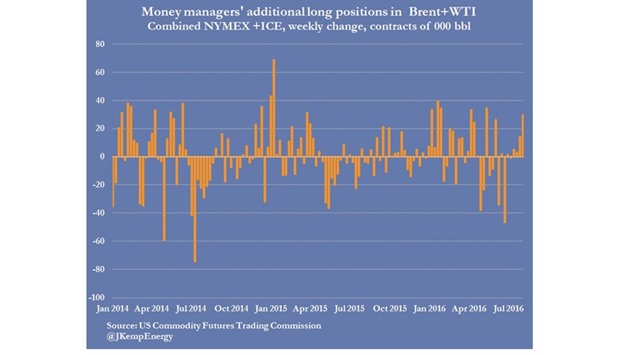Hedge funds increased their bullish long positions in crude oil by the most for over two months in the week ending on August 9. Hedge funds and other money managers boosted net long positions in the three major Brent and WTI futures and options contracts by the equivalent of 48mn barrels.
The increase in net long positions was the largest since the middle of May and comes after hedge funds cut net long positions by a total of 309mn barrels between May 17 and August 2.
Hedge fund managers seem to have reacted to the prospect of a short-covering rally after short positions reached exceptionally high levels.
Hedge funds had previously amassed short positions in Brent and WTI totalling 374mn barrels, the third-largest short position on record and only 19mn barrels below the maximum short position ever recorded. The scale of short positions made a rally highly likely once prices stopped falling and funds started close some positions to lock in previous profits.
In the week between August 2 and August 9, hedge funds continued to add an extra 1.5mn barrels of short positions in NYMEX WTI.
But that was a much smaller increase in short positioning than during the previous weeks, when hedge funds added an average of 35mn barrels of short positions per week.
And in Brent, hedge funds cut short positions by 19mn barrels, the largest one-week reduction since January.
With short covering creating a strong bid in the market, other fund managers raced to add fresh long positions to profit from the expected rally in prices.
Hedge funds added an extra 19mn barrels of long positions in WTI and 11mn barrels of long positions in Brent, according to data published by regulators and exchanges.
The rise in combined Brent and WTI long positions was the largest one-week increase since the middle of May.
The short-selling cycle that lasted from May 31 until August 2 now appears to have turned. Both Brent and WTI prices have increased by more than $5 per barrel, around 13%, since August 2, as hedge funds have scaled back short positions and started to turn more bullish.
The short-covering rally has been accelerated by carefully timed comments from Saudi Arabia and other oil exporters seemingly talking up the possibility of an output agreement at informal talks next month.
In official comments published on Saturday, after leaking on Thursday, Saudi Energy Minister Khalid al-Falih noted “the large short positioning in the market” which has “caused the oil price to undershoot”.
Al-Falih described current prices as “unsustainable” and said oil prices would have to rise from current levels to reverse the decline in investment.
He reiterated that Saudi Arabia was watching the market closely and was ready to take action to help rebalance the market in cooperation with Opec and major non-Opec producers.
Al-Falih specifically noted the ministerial meeting in Algeria next month would provide an informal opportunity to discuss the market situation “including any possible action that may be required to stabilise the market”.
While the comments were no different to previous statements made by Saudi officials over the last 12 months, their timing and carefully scripted nature have been interpreted as a deliberate attempt to influence prices.
By hinting at the possibility of an output agreement, the minister’s verbal intervention has added to the short-term risk of holding short positions and fuelled the rally.

John Kemp is a Reuters market analyst. The views expressed are his own.
